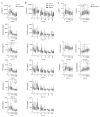Severity-Dependent Long-Term Post-Traumatic Changes in the Circulating Oxylipin Profile
- PMID: 39769293
- PMCID: PMC11680030
- DOI: 10.3390/ijms252413530
Severity-Dependent Long-Term Post-Traumatic Changes in the Circulating Oxylipin Profile
Abstract
Trauma causes the breakdown of membrane phospholipids and the subsequent degradation of the released polyunsaturated fatty acids (PUFAs) to partially bioactive oxylipins. Here, we screened for circulating PUFAs and oxylipins in patients (n = 34) differing from those of uninjured controls (n = 25) and analyzed their diagnostic potential. Patients were followed up for 1 to 240 h after minor/moderate, severe, and very severe injuries. Of the targeted oxylipins, 13 out of 80 (13/80) were detected in almost all patients and controls. Injury caused a long-term decrease in 9- and 13-hydroxyoctadecadienoic acids and in several dihydroxyeicosatetraenoic acids, the stable derivatives of bioactive anti-inflammatory epoxyeicosatrienoic acids, compared to controls. Frequently, these oxylipins correlated inversely to injury severity, days in the intensive care unit and hospital, and/or procalcitonin and pro-inflammatory cytokine levels 48 up to 240 h after trauma. Notably, 20/80 oxylipins were detected in some patients but not or less often in controls. Many of these oxylipins increased transiently immediately after injury. Their level is partly correlated with adverse clinical parameters at this early time point. The circulating oxylipidome was markedly affected by trauma. Several oxylipins showed injury-dependent alterations at different time points in the post-traumatic course.
Keywords: arachidonic acid; injury; oxylipin; polytrauma; polyunsaturated fatty acid.
Conflict of interest statement
The authors declare no conflicts of interest.
Figures





References
-
- Dyall S.C., Balas L., Bazan N.G., Brenna J.T., Chiang N., Da Costa Souza F., Dalli J., Durand T., Galano J.-M., Lein P.J., et al. Polyunsaturated fatty acids and fatty acid-derived lipid mediators: Recent advances in the understanding of their biosynthesis, structures, and functions. Prog. Lipid Res. 2022;86:101165. doi: 10.1016/j.plipres.2022.101165. - DOI - PMC - PubMed
MeSH terms
Substances
LinkOut - more resources
Full Text Sources
Medical

